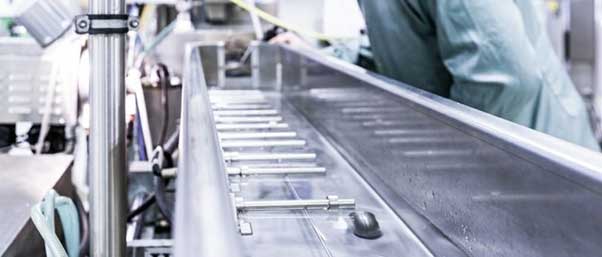|
Raumedic Expands Its Silicone
Business With Two New Facilities

All signs are pointing toward growth at Raumedic in
Helmbrechts (Germany). Two additional production facilities are scheduled to be
erected at the company’s headquarters by 2025. The expansion will focus in
particular on the company’s silicone tubing segment.
Under conditions much like those found in operating rooms, Raumedic manufactures
medical thermoplastic and silicone products for the international medical
technology and pharmaceutical industries.
The planning for the first new building, in which the company will make its
products in a controlled clean-room environment, is almost complete. The
application for a building permit is expected to be submitted in the first
quarter of 2022, and construction work at the site on the industrial park “A9
Mitte” should begin sometime
next spring. The new production facility with 54,000 sq. ft. of floor space will
be specially equipped for silicone processing, with extrusion systems, a
laboratory and a raw-materials technical centre. Medical-grade silicone is
frequently used as a sealing material in medical products, as well as in the
form of tubing required for manufacturing pharmaceuticals and vaccines.
“We’re really seeing increased demand from the pharmaceutical industry at the
moment,” Raumedic CEO Stefan Seuferling said. Nonetheless, the company has
experienced a drop in certain sub-areas. As a result of the coronavirus
pandemic, some regularly scheduled operations have been postponed. To offset the
lower demand for solutions in areas such as ophthalmology and orthopedics, the
company investigated new potential within the pharma industry last year. “In
2019, we also took steps to strengthen sales and marketing as part of our
strategicre positioning of Raumedic,” the CEO said.
Production in the new building will also reach full capacity in the medium term.
“We already know that a third plant will not suffice,” Stefan Seuferling said.
“Over the next 5 years, we will invest a total of €50 million in the structural
expansion of the Helmbrechts location and further increase silicone processing
at the same
time.”
About 80 of the company’s 900 employees worldwide work in silicone extrusion at
the company’s headquarters. Roughly twice as many are expected to be employed in
this production area by 2025. The company needs more employees in virtually
every department as a result of its growth. The Raumedic Group is forecasting
revenue of €150 million worldwide in 2021.
https://www.medicalplasticsnews.com/news/medical-plasticscompany-news/raumedic-expands-its-silicone-business-withtwo-new-faciliti/
2 AUGUST 2021
First 'Made In India' 3-D
Printed Heart Valve Developed In Chennai
The new heart valves developed using 3D printers
can overcome these problems related to artificial heart valves, Dr Sanjay
Cherian, the Vice President and COO at Frontier Lifeline Hospital, said in a
statement.
Chennai: A Chennai-based heart surgeon announced he has designed and developed
India's first 3-D printed heart valve, giving hope to several thousands of
patients requiring heart valve replacement surgery every year.
The currently available artificial heart valves are either made of metal
components (mechanical), or from animal tissues (bioprosthetic), each with its
own disadvantages or complications, such as the risk of blood clot formation,
valve failure due to degeneration, valve infection, the need for longterm blood
thinner medications, etc.
The new heart valves developed using 3D printers can overcome these problems
related to artificial heart valves, Dr Sanjay Cherian, the Vice President and
COO at Frontier Lifeline Hospital, said in a statement.
The heart valves were manufactured using specialised biopolymers that are very
similar to human tissue, which can be directly implanted in heart patients.
"We are happy to announce that we have designed & developed India's first 3D
printed heart valve" Cherian said, calling the innovation "a giant leap in the
field of cardiology/cardiac surgery".
"This new 3D printed heart valve could be the future of cardiac surgery, since
it overcomes most of the disadvantages/complications associated with the
currently available artificial heart valves that are in use today," he added.
Cherian developed the new 3D printed heart valve in collaboration with the
Centre for Automation and School of Mechanical Engineering, Vellore Institute of
Technology (VIT), Chennai.
"Another added advantage of this 3D printed heart valve is that its design was
developed using specialised computer-aided design software andA modeling
techniques, based on the MRI scan images of the human heart, as a result of
which, we are now able to customise and 3D print heart valves that will fit
exactly to the dimensions of the patient's heart" said Cherian.
Especially since it is "Made in India", the cost of this novel heart valve could
be much lower than that of the imported heart valves that are currently used in
India, he noted. Cherian aims to patent this 3D printed heart valve, and test it
to confirm its biocompatibility, efficacy and durability.
https://health.economictimes.indiatimes.com/news/medicaldevices/first-made-in-india-3-d-printed-heart-valve-developed-in-chennai/85420137
, August 18, 2021
|
